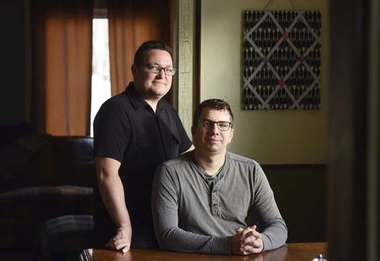South Dakota governor mum on religious adoption protections

South Dakota's Republican governor isn't saying whether he'll sign a measure aimed at protecting faith-based organizations that refuse to place children with gay couples or other arrangements contrary to their religious beliefs.
Gov. Dennis Daugaard, who hasn't signaled what action he will take on the bill, frustrated the more conservative elements of his party last year by vetoing a bill that would have required students to use bathrooms and locker rooms corresponding with their birth gender. Daugaard, who isn't seeking re-election, has also pledged to veto a pair of measures this year expanding gun rights.
"I know it was relatively controversial," Daugaard said last week about the adoptions bill. He said he'd "listen to both sides" and weigh in, but as of Wednesday — the day after the GOP-controlled Legislature passed it — Daugaard's office hadn't signaled whether he had made up his mind.
If Daugaard signs the bill, South Dakota would join Michigan, North Dakota and Virginia to pass so-called religious exemption bills concerning adoption and foster care, and the first since the 2015 U.S. Supreme Court ruling that legalized gay marriage.
Supporters say the measure is necessary to close off the possibility that faith-based agencies might suffer for their religious beliefs if South Dakota eventually bans discrimination based on sexual orientation as several other states have done.
Critics say such exemptions could invite costly federal litigation by cementing in state law the right to discriminate against same-sex couples, single parents and even households that observe a different religion.
"I want to be able to give these organizations and their boards confidence that they have protection so they don't just pre-emptively say we are going to get out of the adoption business," said Sen. Alan Solano, a Republican from Rapid City.
LGBT rights supporters see it differently.
"The freedom of religion is a core American value shared by most and protected in the First Amendment," said Ineke Mushovic, executive director of the LGBT advocacy group Movement Advancement Project.
"But that freedom doesn't give you the right to discriminate. These bills, like the one in South Dakota, are doing exactly that."
Since the U.S. Supreme Court decision on gay marriage, Mushovic said her group has seen a proliferation of state and local religious exemptions designed to let public officials refuse to marry same-sex couples, businesses to deny service to LGBT people and adoption agencies to turn away people based on religious beliefs.
Legislatures in Texas, Alabama and Oklahoma are considering similar bills this year but only South Dakota's has approved it.
Solano had help writing the South Dakota bill from a staff member of Catholic Social Services, an agency that places infants only with adoptive families that meet certain criteria including opposite-sex couples married at least two years who cannot conceive a child on their own.
Jim Kinyon, executive director of the group, said it attempts to ensure the state doesn't discriminate against faith-based organizations for their "sincerely held" beliefs. He said the group has already lost donor support this month due to concern over its vetting practices and its support of the legislation.
"I know that this is somewhat of a contentious bill, but essentially Catholic Social Services has always had priorities in terms of what we do with families we put on our infant adoption list," he said.
Faith-based groups say the religious exemption they want isn't about taxpayer money. South Dakota has five religious agencies that provide adoptions in the state but only one — Lutheran Social Services — gets state and federal funding for child placement.
The groups say they need the legal protections to continue placing children without violating their beliefs. Faith-based adoption agencies in Illinois, Massachusetts, California and Washington, D.C., ended such services after passing non-discrimination laws that include sexual orientation, but such a proposal has gotten little traction in Republican-dominated South Dakota.
Among those testifying against South Dakota's bill was Billy Mawhiney, 38, a Sioux Falls chef and cooking instructor who with his husband is in the process of adopting a child through the state.
Mawhiney said the number of families willing to adopt and foster is decreasing in the state and the measure would make it even harder kids to find loving homes, like the one he and his husband have shared with two foster children.
"I worry about what the future's going to be. If we decide to go for a private adoption next, that limits us tremendously," he said.
___
By Hannah Weikel. Copyright Associated Press - The Gayly 3/8/2017 @ 2:50 p.m. CST





